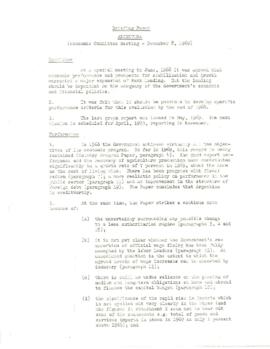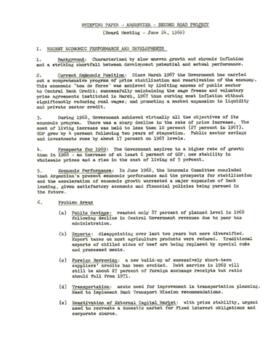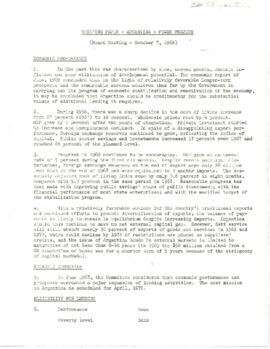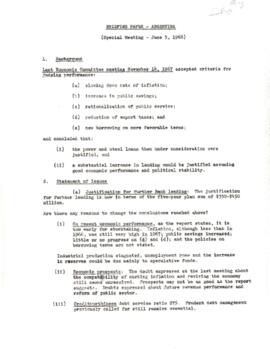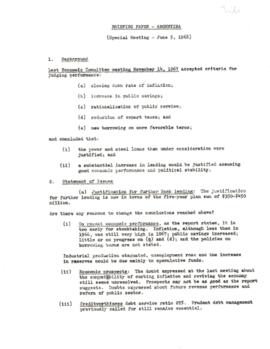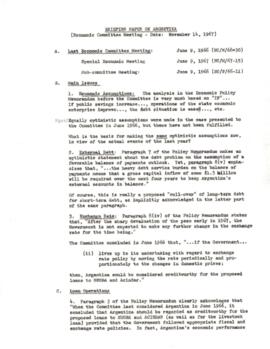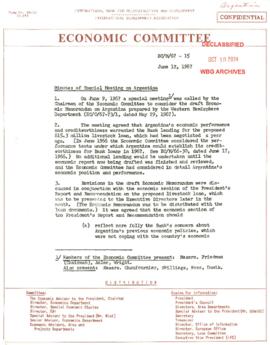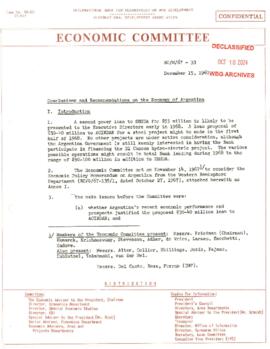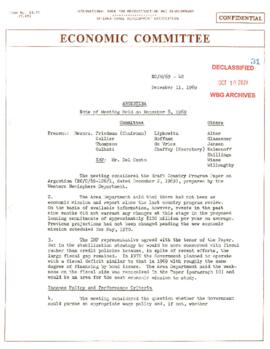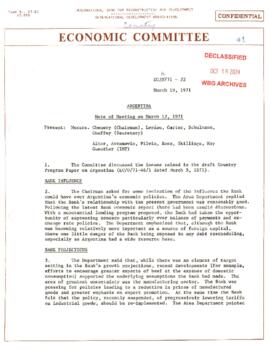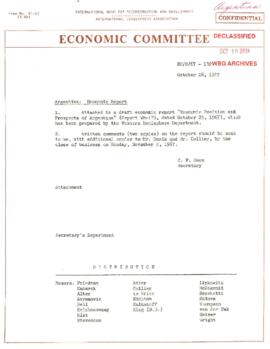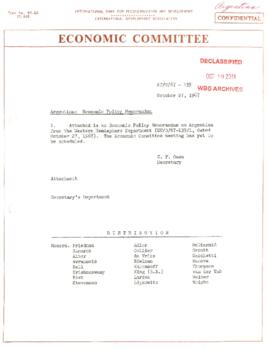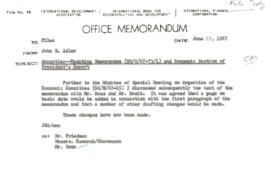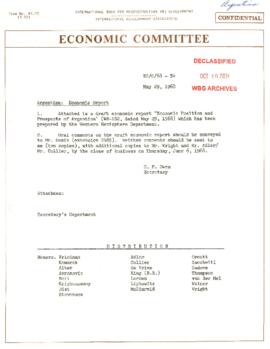Identity area
Reference code
Title
Date(s)
- 1957 - 1972 (Creation)
Level of description
Fonds
Extent and medium
62.01 linear feet of textual records
Context area
Name of creator
Biographical history
The Staff Economic Committee (SEC) was created in 1952 as one element of the World Bank's first Bank-wide reorganization. The objective of the committee was to review and coordinate the Bank's economic policy; its role was advisory in nature. Its primary function was to review country economic reports drafted by Bank-coordinated country missions. However, the body also performed other functions, including:
-
Sharing information on all economic studies being considered or in preparation in the various departments of the Bank;
-
Coordinating all economic studies to avoid duplication and ensure consistency;
-
Making available to the members of the committee general economic information of interest to them for their work;
-
Assisting in formulation of Bank-wide views on economic and financial problems related to operations;
-
Providing a channel for consultation on any economic problem of concern to the individual members of the committee.
The committee was initially chaired by Economic Staff Director Leonard Rist and its members included economic advisers to the directors of the area departments, economic adviser to the director of the Technical Operations Department (TOD), and advisers to the director of the Economic Staff.
The assistant to the director of the Economic Staff (or, after 1964, the Economic Department) generally served as the secretariat for the committee through 1965. A number of individuals contributed to the secretariat function during this period, all of whom were located in the Bank'sEconomic Staff/Department: Badri Rao, J. P. Hayes, Bruce M. Cheek, Ravi Gulhati, A. J. Macone, M. H. R. Jordan, J. F. Fanel, Shamser Singh, M. V. Shivman, John Froland, Doreen E. Crompton, and Palo Leon.
The committee chairman was responsible for establishing the agenda for the committee's weekly meetings based on consultation with committee members and the Staff Loan Committee (SLC). Results of committee meetings were communicated to the operating department heads through their respective economic advisers and to management by the chairman of the committee. The SEC did not consider loan proposals nor did it recommend terms for particular loan or credit proposals.
As stated, the committee's primary function was the review of country economic reports. For the institution's first 15-20 years, the Bank's country economic reporting involved extended country visits by general survey missions consisting of a combination of Bank staff and external consultants. The resulting economic studies produced by the mission teams were lengthy and comprehensive publications that provided recommendations for the Bank and the country's government for approaches to future economic policy in each country.
However, by the mid-1960s, the Bank had begun moving away from comprehensive country economic reports, transitioning to more succinct, focused, and frequently updated country program and country sector publications. This transition was, in part, responsible for changes made to the SEC in early 1965. At this time, the Staff Economic Committee was reconstituted as the Economic Committee (EC) and the Bank's Secretary's Department became the secretariat for the rechristened committee. C. F. Owen served as the committee's secretary from 1965 until November 1969; J. Chaffey held the role from December 1969 to December 1971.
Other changes implemented in 1965 involved the procedures guiding the review of economic reports and survey mission reports. Previously, all economic reports and survey mission reports were automatically the subject of a meeting of the full committee. The new procedure directed reports that contained issues which were deemed significant to a more focused sub-committee for initial quality review before being forwarded to the full EC. The sub-committee was usually composed of representatives of the Area Department concerned, the Economic Department, the secretary of the Committee and those economic advisers that chose to attend.
In 1967 an additional layer of review was created with the formation of a smaller group called the "country economic working party" consisting of the economic adviser from the relevant Area Department, a senior representative of the Economic Department, and the author or authors of the report. Meetings of this team would consider reports at a somewhat earlier stage in the drafting process. The sub-committee remained in existence in case it should be needed.
The responsibilities of the EC did not change substantially as part of the changes enacted in 1965. It continued to consider and review the Bank's economic operations and activities and to recommend action to be taken by the Bank Group president or the Loan Committee. The economic operations and activities under consideration included formulation of economic judgments and policies, and implementation of general economic policies in Bank operations, research, and publication of economic and statistical material. The EC also ensured that high and consistent standards of economic performance were maintained in the Bank's economic work.
Analyses and evaluations of member countries' economies, development policies, programs, priorities, performance, and creditworthiness continued to command much of the committee's attention. The committee's work in this area was intended to provide the framework for a general program for World Bank activities in each country. In addition, the committee examined all economic appraisals and reviews of area and regional problems and prospects. Together, this area of country-focused review was referred to as "program review". At the same time, the committee reviewed and made recommendations on economic issues of general importance to the activities and policies of the Bank Group. These were referred to as "policy review" discussions.
As of 1965, EC members included the economic adviser to the president, who served as committee chairman; the director of the Economic Department; the director of Special Economic Studies; Special Adviser to the President Leonard Rist; the director of the Economic Development Institute (EDI); and an economic adviser as designated by the director of each of the regional operations departments. Open invitations were also extended to directors of Area Departments with responsibility for countries under discussion, the chairman of the Loan Committee, directors of the Development Services Department (DSD) and Office of Information (INFO), the World Bank Group (WBG) treasurer, and a representative of the International Finance Corporation (IFC). By 1971, a standing invitation had been extended to the International Monetary Fund (IMF) to send a representative to program review meetings.
The importance and extent of the committee's program review work intensified with Bank Group President McNamara's announcement at the Bank/Fund Annual Meetings in 1969 of an expansion of country economic reporting and the regular publication of Country Program Papers (CPPs). These reports, intended to describe individual country's economic challenges and prospects, were initially intended to be published annually for larger member countries and every two or three years for smaller borrowers. The EC's role was to review the CPPs to clarify the economic issues of the reports prior to the president's review. The committee would meet on all the CPPs scheduled for review by the president but not necessarily on those to be reviewed by the president's economic adviser.
In 1971 the EC's secretariat was moved to the Economic Program Department (EPD) of the new Development Policy Vice Presidency (VPD); the EPD had inheritedthe program review functions of the former Economic Department.
The review of CPPs took up the majority of the committee's attention. As of February 15, 1972, consideration of CPPs was the focus of more than half of the committee's meetings while review of sector program papers and development papers took up more than a quarter. Reviews of the Bank's research program and discussion of economic reporting procedures were also under the purview of the committee.
The EC was abolished as part of the Bank-wide reorganization of 1972. Its replacement, the Policy Review Committee (PRC), had a much smaller scope than the EC. The focus of the new PRC was exclusively on development and operational policy papers. The committee reviewed all policies requiring the approval of the president (as well as other papers selected by the chairman). Following its review, the committee advised the WBG president on the quality and adequacy of the policies it reviewed prior to the president's approval.
As part of the 1972 changes, the responsibility for the review of CPPs was transferred to the regional vice president responsible for the country in question. The PRC contributed to the review of CPPs but no longer chaired the meeting.
Other significant differences between the abolished Economic Committee and the new PRC included the WBG president acting as chairman of the PRC and the Policy Planning and Program Review Department (PPPR) of the VPD serving as secretariat.
Repository
Archival history
This fonds consists of two collections of records that were maintained by more than one individual, office, or information center and transferred to the World Bank Group Archives' custody separately. In some cases, prior to their transfer to the archives, records were physically transferred between the offices of individuals and units that either participated in the Staff Economic Committee and/or Economic Committee or served as its secretariat. As such, custody of the records in this fonds is difficult toconfirm. Also note that there is considerable duplication between the two collections.
The first group of records include official committee records that were in the custody of the Secretary's Department (SEC) until at least 1971, although it is likely they were not always maintained in a single physical location. In late 1971 or early 1972, these records were transferred to the Development Policy Vice Presidency (VPD) where the Economic Program Department (EPD) had inherited the program review functions of the former Economic Department and had taken over the committee's secretariat function from the Secretary's Department. After the committee ceased to function in October 1972, custody of the official committee records was transferred to the Policy Planning and Program Review Department (PPPR) which absorbed EPD's Program Review Division and responsibilities of secretariat for the new Policy Review Committee (PRC). In 1974, these Economic Committee records were transferred to the Central Files' records center from the VPD to which PPPR reported. In 1990 or 1992, they were transferred to the World Bank Group Archives.
A second group of records in this fonds were collected and maintained by individuals who attended committee meetings or served as its secretary. These include the files of Enrique Lerdau, Acting/Deputy Director of the Economic Program Department (EPD), which were collected during his time as an economist in the Western Hemisphere and Europe and Middle East Departments (minutes and reports dating from 1965 to 1972). The second group of records also include a set that Lerdau apparently received from the EC's Secretary Clifford Owen (minutes and reports dating from 1965 to 1970). These records appear to have been transferred to the Bank's Non-Regional Information Center (NRIC) in 1978 and, later, perhaps in 1990, to the World Bank Group Archives.
Immediate source of acquisition or transfer
Content and structure area
Scope and content
Fonds contains records related to the activities of the Staff Economic Committee (SEC) and its successor the Economic Committee (EC). Records consist of communications from the committees' secretariat to committee members and the draft reports that the committee reviewed; other reports or background information that was not reviewed by the committee but used for informational purposes are also included. Records of the subcommittee, created in 1965, are also included, but in small number.
Records related to the first five years of SEC (1952-1957) are not included and are unaccounted for. Records relating to the work of the SEC from 1958 to 1964 are included, although in lesser number than those relating to the EC. Only committee communications for the SEC from 1958 to 1964 are included.
Appraisal, destruction and scheduling
Accruals
No accruals are expected.
System of arrangement
It is likely that the records in this series, particularly those comprising the official committee records that were maintained by the committee's secretariat, were originally maintained in binders. During processing soon after the time of transfer, in most cases a single document was placed in each folder. As such, there is no arrangement to describe other than the order in which the folders have been placed in the boxes.
Note that, beginning in 1965 committee was reconstituted and the name changed, official records began to be filed in "black books", each representing a different class of records: EC/A (notice of meeting memoranda), EC/F (memoranda related to subcommittee meetings), EC/M (notice of meetings, conclusions and recommendations, and minutes), and EC/O (reports distributed to committee members, most but not all under review by the committee).
Conditions of access and use area
Conditions governing access
Records are subject to the World Bank Access to Information Policy.
Conditions governing reproduction
Records are subject to the Copyright Policy of the World Bank Group.
Language of material
- English
Script of material
Language and script notes
Physical characteristics and technical requirements
Finding aids
Allied materials area
Existence and location of originals
Existence and location of copies
Related units of description
Notes area
Alternative identifier(s)
Access points
Subject access points
Place access points
Name access points
Genre access points
Description control area
Description identifier
Institution identifier
Rules and/or conventions used
Internal World Bank Group Archives rules based on ISAD(G).
Disclosure status
Level of detail
Dates of creation revision deletion
24 June 2022


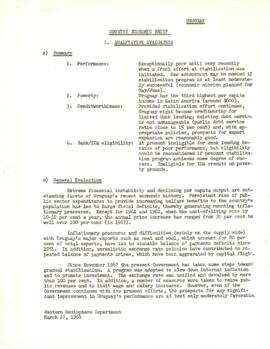
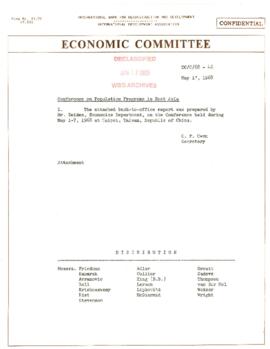
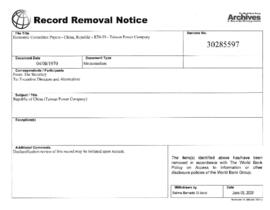


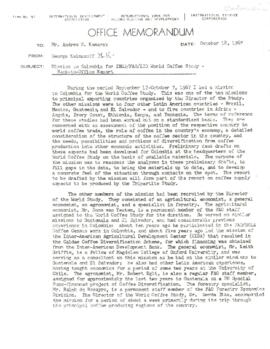
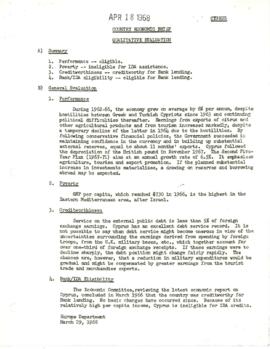
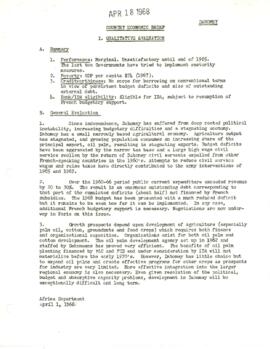




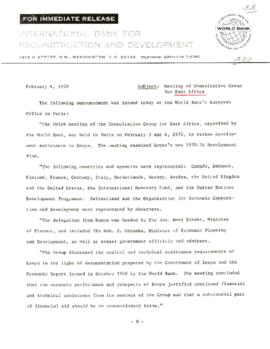
![Economic Committee Papers - East Africa - IBRD - Mission to East Africa - Back to Office [BTO] Re...](/uploads/r/world-bank-group-archives/3/a/0/3a0477f981404f8063fd677d08cc842fdf3ef75974ece0177b0c1a54f65db8bb/WorldBankGroupArchivesfolder30276243_142.jpg)
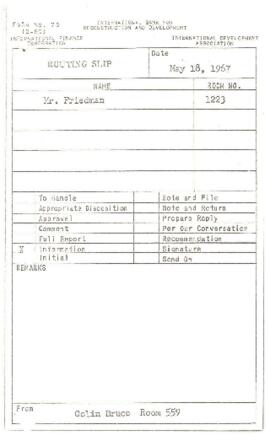
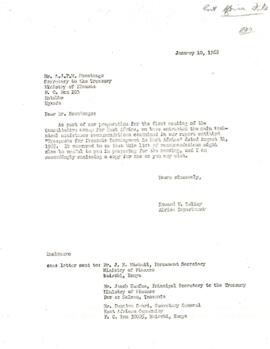
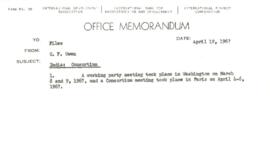
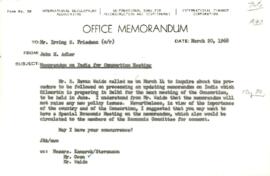


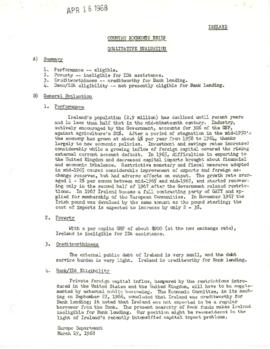
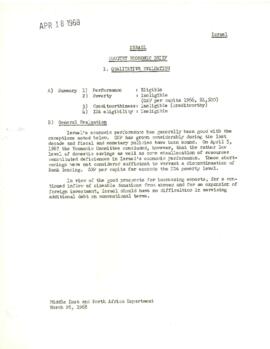

![Economic Committee Papers - Kenya - Economic Mission to Kenya - Terms of Reference [TOR]](/uploads/r/world-bank-group-archives/2/0/f/20f61be38753ac0a9f83b6e057fd25afbceed607d7b1fbd30d017d3bf65c0544/WorldBankGroupArchivesfolder30281493_142.jpg)

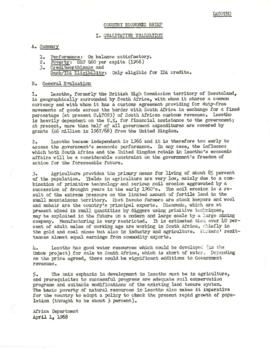
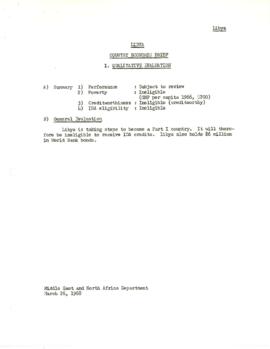
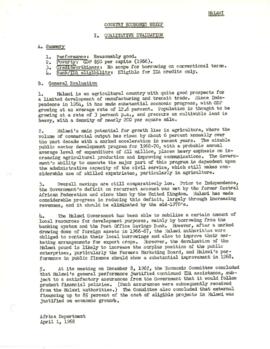
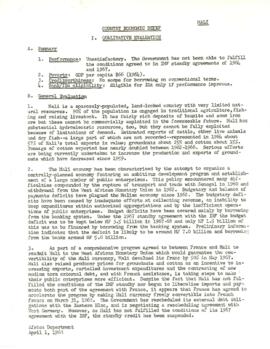
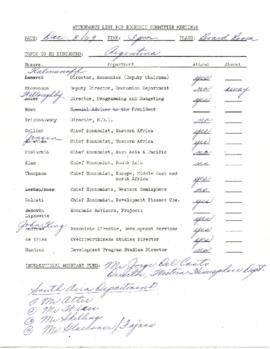
![Economic Committee Papers - Argentina - Back to Office [BTO] Report of Economic Mission](/uploads/r/world-bank-group-archives/b/b/f/bbfebdb763a9f334d267ee656857340558f58235dfdbb7bb97d8df9aae50a215/WorldBankGroupArchivesfolder30275569_142.jpg)
![Economic Committee Papers - Argentina - Back to Office [BTO] Report of Economic Mission](/uploads/r/world-bank-group-archives/4/9/2/492b19a1aa003b747bf73011c3f8b16466d58e24c50e09a3ea8fc34bd1b0390a/WorldBankGroupArchivesfolder30275571_142.jpg)
